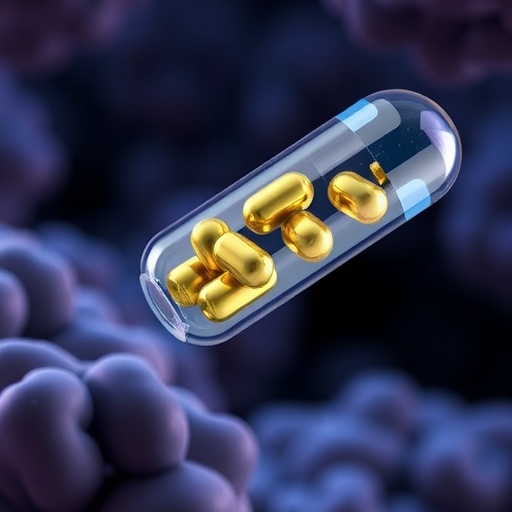In a groundbreaking move poised to reshape supportive care in hematopoietic stem cell transplantation (HSCT), researchers have unveiled an ambitious clinical trial protocol investigating the potential of encapsulated fecal microbiota transplantation (FMT) to mitigate the notorious side effects associated with this life-saving procedure. HSCT, a cornerstone therapy for various hematological malignancies, often subjects patients to a harsh regimen that disrupts their delicate gut microbiota, thereby exacerbating complications such as severe gastrointestinal toxicity, infections, and delayed immune recovery.
The study, termed the HSCT-BIOME trial, is designed as a double-blind, randomized, placebo-controlled investigation that aims to rigorously assess the tolerability, safety, and efficacy of peri-transplant oral FMT administered via encapsulated formulations. Unlike previous therapeutic applications of FMT—which have largely been limited to treating active infections or post-immune reconstitution phases—this trial uniquely proposes a dual-course dosing schedule that begins immediately prior to conditioning and resumes at neutrophil recovery, targeting a window believed critical for microbial restoration.
Gut microbiota composition has increasingly been recognized as a pivotal influencer of clinical outcomes following HSCT. Disruption of microbiome homeostasis during conditioning regimens—intended to ablate diseased bone marrow and permit engraftment—can lead to a dominance of pathogenic microbes and loss of beneficial communities. Such dysbiosis may directly contribute to gastrointestinal toxicity characterized by severe diarrhea, as well as increase susceptibility to bloodstream infections and graft-versus-host disease (GVHD), all of which collectively worsen morbidity and mortality.
The HSCT-BIOME study addresses these challenges by delivering encapsulated FMT, a novel approach leveraging oral administration to restore microbial diversity and resilience in the gut ecosystem. This method circumvents many logistical and safety hurdles associated with traditional FMT delivery techniques such as colonoscopy or nasogastric tubes, enhancing patient convenience and adherence. The encapsulated format, delivering concentrated and well-characterized microbiota, is hypothesized to stabilize the gastrointestinal microenvironment during the vulnerable peri-transplant period.
The trial protocol outlines an initial open-label safety run-in involving five participants, followed by a randomized phase with 51 adults undergoing autologous HSCT for hematologic malignancies. Participants will be assigned in a 2:1 ratio to receive either the active FMT capsules or placebo. The primary endpoint focuses on the incidence of severe gastrointestinal toxicity, defined by sustained episodes of severe diarrhea based on the Bristol Stool Chart within three weeks post-transplant. Secondary assessments include monitoring treatment-emergent adverse events and adherence rates, ensuring a comprehensive evaluation of both safety and tolerability.
This approach is underpinned by the hypothesis that preconditioning FMT administration primes the gut microbial communities to withstand the cytotoxic onslaught of HSCT regimens, mitigating collapse of beneficial taxa and reducing antibiotic-resistant pathogen overgrowth. The follow-up dosing during neutropenia further aims to enhance microbial reconstitution during a phase marked by profound immunosuppression. Success in this endeavor could translate into reduced gastrointestinal toxicity rates and improved immune reconstitution kinetics, ultimately improving transplant outcomes.
Beyond symptomatic management, this study targets the gut microbiota as a modifiable factor influencing long-term transplantation success. Emerging evidence implicates the microbiome not only in immediate toxicity but also in relapse rates and graft-versus-host disease pathogenesis. By preserving or restoring microbial equilibrium, encapsulated FMT may offer a multifaceted therapeutic avenue to reshape post-transplant immunological landscapes favorably.
Importantly, the double-blind, placebo-controlled design ensures methodological rigor that addresses the placebo effect and observer bias, often pervasive in clinical microbiota interventions. Such stringent measures lend credibility to forthcoming data and pave the way for evidence-based clinical guidelines. The multi-center nature of the trial enhances generalizability across diverse patient populations and healthcare settings.
While previous pilot studies have suggested FMT’s potential in HSCT recipients, those trials were often limited by open-label designs, small cohorts, or treatment administered only after complications emerged. The HSCT-BIOME trial’s preventive strategy, encompassing administration before transplant conditioning, represents a paradigm shift—targeting the microbiome proactively rather than reactively.
If successful, this trial heralds a future where microbiota modulation becomes a standard adjunct in HSCT protocols, reducing reliance on antibiotics that further disrupt microbial ecosystems. It also opens doors to refining donor selection and optimizing FMT formulations for enhanced efficacy and safety. Furthermore, oral encapsulated FMT could be expandably applied to other immunocompromised populations vulnerable to gut dysbiosis.
Nevertheless, the investigators emphasize safety monitoring as paramount, given the potential for adverse events in immunocompromised hosts. The trial’s staged design—with an initial safety cohort—reflects this caution, ensuring thorough vetting before broader efficacy assessment. Adherence tracking will also shed light on patient acceptance of oral encapsulated therapies in this context.
With registration under ACTRN12624001104549 and a scheduled publication in a leading oncology journal, the HSCT-BIOME study represents a critical juncture in translational microbiome science intersecting with clinical hematology. Its outcomes could profoundly influence both clinical practice and the burgeoning field of microbiota therapeutics, ultimately enhancing quality of life and survival for HSCT patients worldwide.
As attention on the gut microbiome’s role in health intensifies, this trial exemplifies how targeted microbial interventions may revolutionize complex medical treatments. The promise of encapsulated FMT to safeguard against HSCT-induced gastrointestinal toxicity resonates beyond specialist realms, inspiring multidisciplinary collaboration among oncologists, microbiologists, immunologists, and bioengineers.
In sum, the HSCT-BIOME trial encapsulates a strategic leap from descriptive microbiome associations toward actionable clinical interventions. By harnessing the power of encapsulated fecal material administered pre- and post-transplant, researchers aim to rewrite the narrative of transplant side effect management. The medical community awaits the results, hopeful that this scientific venture might soon shift the paradigm of HSCT supportive care.
Subject of Research: Investigation of the safety, tolerability, and efficacy of peri-transplant oral encapsulated fecal microbiota transplantation (FMT) to reduce gastrointestinal toxicity and improve outcomes in hematopoietic stem cell transplantation (HSCT) recipients.
Article Title: A study protocol for a double-blinded, randomised, placebo-controlled trial on the use of encapsulated FMT for reducing the side effects of HSCT: the HSCT-BIOME study.
Article References:
Li, A., Costello, S.P., Bryant, R.V. et al. A study protocol for a double-blinded, randomised, placebo-controlled trial on the use of encapsulated FMT for reducing the side effects of HSCT: the HSCT-BIOME study. BMC Cancer 25, 656 (2025). https://doi.org/10.1186/s12885-025-14057-4
Image Credits: Scienmag.com




